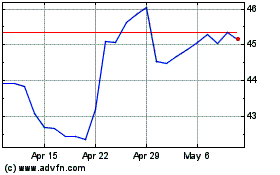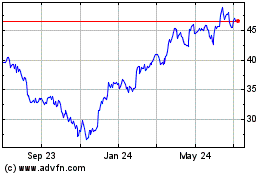Are Auto Makers the New Value Stocks?
July 08 2019 - 2:00PM
Dow Jones News
By Corrie Driebusch
Ford Motor Co. and General Motors Co. possess an unusual pairing
of superlatives: The auto makers boast two of the highest dividend
yields in the S&P 500 while also having two of the lowest
price-to-earnings ratios on a forward-looking basis.
The two motor companies were battered heading into 2019, hurt by
sluggish auto sales and fears of exposure to simmering trade
tensions with China. Another overhang for the duo: higher interest
rates, which make it more expensive for consumers to borrow money
to buy cars.
Ford finished 2018 down 39%, while GM's stock lost 18%, compared
with the S&P 500's 6.2% decline. So far this year, auto makers
have recovered in step with the broader stock market. GM shares
have rallied 15%, while Ford is up 33%. In addition to some
progress in China-U.S. trade talks, the headwind of higher rates
has largely dissipated, with interest rates falling and the yield
on the 10-year U.S. Treasury note dipping below 2%.
Another reason for the two stocks' current attractiveness is
that they appear cheap by at least one common measure. Ford's stock
is trading at 7.2 times the company's forward earnings, while GM's
is trading at 5.9 times its forward earnings, according to FactSet.
Those ratios are slightly below their respective five-year averages
of 7.6 times earnings and 6.4 times earnings, respectively, and far
lower than the 17.1 times forward earnings at which the S&P 500
currently trades, FactSet data show.
In addition to being relatively cheap, both stocks are boasting
high dividend yields. Ford's dividend yield is a whopping 5.9% --
one of the highest among S&P 500 companies -- while GM's is
4%.
Both companies still have their issues. Analysts say it is fine
and well to offer hefty dividends, but the big question is how
sustainable those dividends are. GM, for instance, is anticipating
a temporary profit boost in 2019 resulting from job cuts and plant
closures. Ford has also been cutting jobs to reverse profit
declines.
U.S. car sales also continue to struggle. In June, U.S. unit
vehicle sales ticked downward, with 17.2 million annualized units
moving off lots, according to AutoData. The U.S. auto industry has
posted six consecutive months of sales declines, and analysts
expected in June that industry-wide sales would fall short of the
17 million mark for the first time since 2014.
The U.S. and China also appear to be moving toward an agreement
in their trade disputes. With those tensions still hanging over the
industry, it remains a tough time for many people to decide to buy
a car -- typically one of the biggest consumer purchases outside of
home-buying -- according to AutoData, which tracks vehicle sales.
This could make for volatile times for the industry in the short
term.
Write to Corrie Driebusch at corrie.driebusch@wsj.com
(END) Dow Jones Newswires
July 08, 2019 13:45 ET (17:45 GMT)
Copyright (c) 2019 Dow Jones & Company, Inc.
General Motors (NYSE:GM)
Historical Stock Chart
From Mar 2024 to Apr 2024

General Motors (NYSE:GM)
Historical Stock Chart
From Apr 2023 to Apr 2024
